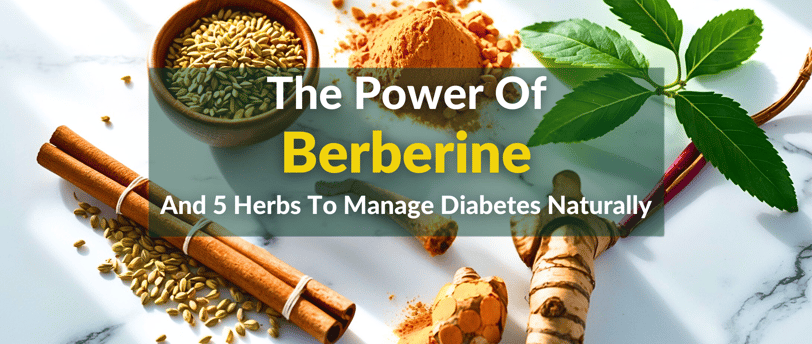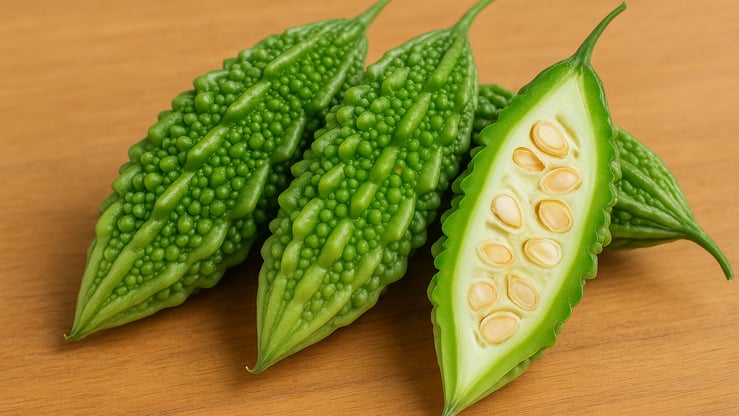The Power of Berberine: Top 5 Herbs to Manage Diabetes Naturally
Discover the power of berberine and 5 top herbs to manage diabetes naturally. Learn how bitter melon, cinnamon, and more can balance blood sugar effectively.
Hope Sinclaire
5/29/20255 min read


Let’s be honest—managing diabetes can feel like a full-time job. But what if the key to balancing your blood sugar was already growing in your garden or sitting in your spice rack?
Enter the world of powerful herbs.
And leading the charge is berberine, a golden compound with ancient roots and cutting-edge scientific backing. In this article, we’ll explore The Power of Berberine: Top 5 Herbs to Manage Diabetes Naturally—breaking down how each one works, why it matters, and how to actually use them.
What Is Berberine and Why Should You Care?
Berberine isn’t just some trendy wellness supplement—it’s one of the most researched natural compounds for diabetes. Found in plants like barberry, goldenseal, and Oregon grape, this alkaloid has been used in Chinese and Ayurvedic medicine for centuries.
What makes berberine a game-changer?
Activates AMPK: This enzyme is like your body’s internal thermostat for energy use and fat burning. When it’s turned on, glucose uptake improves and fat storage decreases.
Lowers insulin resistance: Berberine helps cells become more responsive to insulin, reducing the need for your pancreas to work overtime.
Reduces sugar production in the liver: This helps prevent excess glucose from flooding your bloodstream.
Improves gut health: It acts as a natural antimicrobial and supports healthy gut bacteria—which is huge for blood sugar control.
Balances lipid levels: It also lowers LDL cholesterol and triglycerides, which is critical for people managing both diabetes and heart risk.
Clinical Bonus: Studies show that berberine can lower fasting blood sugar by as much as 20%—a stat on par with metformin, the gold-standard diabetes drug.
No hype, just powerful science. Berberine is the foundation of this natural diabetes-fighting team.
1. Bitter Melon – Nature’s Plant-Based Insulin
If there’s one herb that walks and talks like insulin, it’s bitter melon. Used for centuries in traditional medicine from China to India, this green, bumpy fruit is more than just a culinary curiosity.
Here’s what it does:
Polypeptide-p: This insulin-like compound lowers blood glucose levels immediately after consumption—no waiting around.
Charantin: A blend of steroidal saponins, which improve glucose uptake and reduce glucose synthesis.
Vicine and momordicin: These compounds enhance bitter melon’s overall hypoglycemic (blood sugar-lowering) effects.
Why it's incredible for diabetics:
It can mimic insulin in the body—helping shuttle glucose into your cells instead of letting it float around in the blood.
It helps manage postprandial (after-meal) sugar spikes.
It’s rich in antioxidants, protecting your cells from oxidative damage common in diabetes.
Tip: Juice it with a splash of lemon for better taste. Or sauté it into a stir-fry to balance the bitterness with flavor.
Yes, it’s bitter. But so is diabetes. Choose wisely.
2. Fenugreek – Tiny Seeds With Massive Impact
You’d never guess that something so small could pack such a punch. Fenugreek seeds are a staple in Indian cooking—and a rising star in blood sugar management.
What makes fenugreek so effective?
4-Hydroxyisoleucine: This unique amino acid boosts insulin secretion, particularly after eating.
High soluble fiber: Slows digestion and carbohydrate absorption, resulting in a gentler rise in blood sugar.
Improves lipid profiles: Fenugreek also lowers cholesterol and triglycerides—helping protect your heart along the way.
Real-world results:
Research shows that consuming fenugreek daily can reduce HbA1c levels, a key marker of long-term glucose control.
It improves satiety, which can help reduce unhealthy snacking and overeating—especially in insulin-resistant individuals.
🥄 How to use it: Soak 1–2 teaspoons of seeds overnight. Drink the water in the morning and chew the seeds, or grind them into a powder to add to meals.
Small seed. Big promise.
3. Cinnamon – Sweet, Spicy, and Sugar-Smart
You know it as the flavor in your lattes and apple pie—but cinnamon is also a natural blood sugar regulator.
Here’s why it earns a spot on this list:
Cinnamaldehyde: The active compound that boosts insulin sensitivity, helping your cells respond more effectively to insulin.
Mimics insulin activity: Cinnamon can actually act like insulin, allowing glucose to move into cells faster.
Slows digestion of carbs: By inhibiting certain digestive enzymes, cinnamon reduces the amount of sugar released into the bloodstream after a meal.
Rich in polyphenols: These antioxidants combat oxidative stress, which worsens insulin resistance over time.
Clinical edge: Studies suggest 1–6 grams per day can lower fasting glucose levels, total cholesterol, LDL, and triglycerides—while increasing HDL.
Pro tip: Use Ceylon cinnamon (a.k.a. “true” cinnamon). It has lower levels of coumarin, a compound that can harm your liver in large doses.
Cinnamon: the sweet solution to sour sugar levels.
4. Gymnema Sylvestre – The Sugar Slayer
This leafy herb from India lives up to its name—Gymnema means “sugar destroyer.” But it doesn’t just block sugar taste… it blocks sugar absorption and boosts insulin performance, too.
Here’s how it works:
Gymnemic acids: Bind to sugar receptors on the tongue, dulling your taste for sweets.
Inhibits sugar absorption in the intestines, reducing blood sugar spikes after meals.
Supports insulin-producing cells: Helps regenerate pancreatic beta cells, increasing natural insulin output.
Why it’s a breakthrough herb:
Reduces sweet cravings, making it easier to stick to a healthy diet.
Improves glucose metabolism and HbA1c levels.
Safe and effective when used in capsules or teas.
Daily use: 200–400 mg of Gymnema extract before meals may drastically reduce sugar cravings and improve glucose control.
Block the craving. Block the spike.
5. Turmeric – The Anti-Inflammatory Golden Shield
While turmeric isn’t a direct glucose regulator, it plays a major supportive role in the diabetes puzzle.
Why? Because chronic inflammation and oxidative stress are at the core of Type 2 diabetes—and turmeric crushes both.
Why turmeric is a silent hero:
Curcumin: This active compound targets inflammation and reduces insulin resistance.
Improves endothelial function: Supports better blood vessel health, which is crucial for diabetic patients.
Lowers free radicals: Prevents cellular damage, especially in the pancreas and liver.
Bonus benefit: Turmeric enhances fat metabolism, reducing weight gain—another major factor in Type 2 diabetes.
How to take it: Use in curries, make golden milk, or take a daily curcumin supplement with black pepper (which boosts absorption up to 2,000%).
The golden spice that protects your golden years.
Frequently Asked Questions
Q: Can I take all five herbs together?
A: Yes! Many people rotate them or combine them in herbal formulas. But start slow and monitor your blood sugar to avoid drops. Always talk to your doctor if you're on medication.
Q: How long before I see results?
A: Most herbs start working within 2–4 weeks, but consistent use over 8–12 weeks leads to stronger and more sustainable results.
Q: Are these herbs safe long-term?
A: In recommended doses, yes. They’re generally well-tolerated—but purity matters. Choose high-quality, organic supplements and avoid excessive dosing.
Final Thoughts: Nature’s Pharmacy Work
The Power of Berberine: Top 5 Herbs to Manage Diabetes Naturally isn’t just a catchy title—it’s a proven roadmap to better blood sugar without the side effects. These herbs work with your body, not against it, helping you take back control in a natural, sustainable way.
Whether you’re just starting your diabetes journey or you’re looking for holistic tools to complement your routine, this herb-powered team is here to help you feel better, think clearer, and live stronger.
Because healing doesn’t always come in a pill—it often starts in a plant.


Affiliate Disclosure: Some links on this site are affiliate links, meaning we may earn a commission at no extra cost to you. We only recommend products we trust.
Contact us at:
© 2025. hoperenewlifestyle.com All rights reserved.
